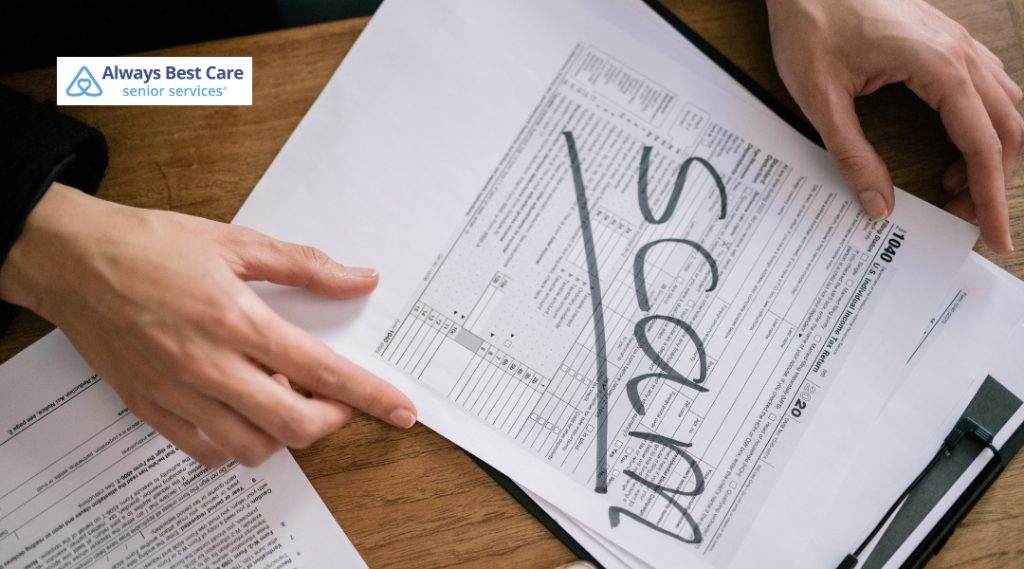Protect Yourself: Avoiding Scams in Birmingham, AL, for Seniors

As we age, life should get easier, but unfortunately, scammers don’t take a break.
In fact, they often target people who may not be as familiar with the latest tricks and technology.
Seniors in Birmingham, AL, are no exception.
Whether it’s a phone call or an unsolicited email, scams are everywhere—and they can be incredibly convincing.
But don’t worry! With the right tools, seniors can protect themselves and keep their finances safe.
Table of Contents
Why Seniors Are Targeted by Scammers
It’s no secret that scammers target seniors, and they do it for a good reason. Seniors often have accumulated savings or assets over the years, which makes them prime targets.
Plus, many seniors still trust, making them more susceptible to fraudulent schemes. Add in the fact that some may be less familiar with technology and online scams, and you’ve got a perfect storm for scammers to exploit.

4 Common Scams Targeting Seniors in Birmingham
Scams come in all shapes and sizes, but here are some of the most common ones that seniors in Birmingham, AL, should watch out for:
- IRS Scams: Scammers pretending to be from the IRS demand immediate payment for back taxes. They often threaten arrest or legal action if money isn’t sent right away. But the IRS will never call demanding payment—if you get a call like this, hang up!
- Tech Support Scams: If a pop-up on your computer tells you that your device is infected, it’s likely a scam. Fraudsters often call, pretending to be tech support, offering to fix the issue in exchange for payment or access to your computer.
- Prize and Sweepstakes Scams: “Congratulations! You’ve won a prize, but you need to pay a fee to claim it.” This is a red flag. Real prizes don’t require an upfront payment.
- Romance Scams: These scams prey on loneliness, especially for seniors looking for companionship online. Scammers develop fake relationships and then ask for money to cover supposed emergencies or travel expenses.
How to Spot the Red Flags of a Scam
One of the easiest ways to avoid being scammed is by knowing the warning signs. If you or your loved one in Birmingham receives an unsolicited call or email, stop and think. Ask yourself: “Does this feel too good to be true?” Here are some red flags to look out for:
- Urgency: Scammers love to create a sense of urgency. They’ll tell you to act now, or you’ll miss out. Real businesses don’t pressure customers into immediate decisions.
- Requests for Personal Information: Never give out personal details—like your Social Security number or bank account information—over the phone or online, especially to unsolicited contacts.
- Too Good to Be True Offers: If it sounds too good to be true, it probably is. Free vacations, lotteries, or unrealistic investment opportunities are often scams designed to steal your money.
- Suspicious Links or Attachments: Avoid clicking links or downloading attachments from unfamiliar sources. These could be phishing attempts or malware.

4 Practical Steps to Protect Yourself from Scams
Seniors in Birmingham, AL, can take several simple steps to protect themselves from scams:
- Verify the Source: Always verify who you’re speaking with before sharing any personal information. Call the company or government agency directly using a known number (not the one given to you by the caller).
- Use Caller ID and Block Unwanted Numbers: Many smartphones offer built-in spam and scam call-blocking features. Take advantage of these tools to reduce the chances of getting scammed.
- Don’t Rush Into Anything: Scammers will often try to get you to make quick decisions. Take your time and talk things over with a trusted family member or friend.
- Report Suspicious Activity: If you suspect a scam, report it to local authorities or the Federal Trade Commission (FTC). The more reports they get, the better they can track and shut down scammers.
Local Resources for Seniors in Birmingham, AL
There are several resources in Birmingham that seniors can take advantage of to stay informed and protect themselves from scams:
- Birmingham Senior Centers: These centers offer workshops, resources, and social activities for seniors.
- AARP Alabama: Provides information on senior fraud prevention and other important issues.
- Birmingham Police Department: Offers senior fraud prevention programs and community outreach.

FAQ: Scam Safety for Seniors in Birmingham
What should I do if I think I’ve been scammed?
If you think you’ve been scammed, stop all communication with the scammer immediately. Contact your bank to freeze accounts and report the scam to local authorities and the FTC.
How can I verify if a call is a scam?
If you receive an unsolicited call, don’t provide personal information right away. Hang up, then call the organization directly using a number from their website or official documents to verify the request.
Are there any local services in Birmingham to help prevent scams?
Yes! The Birmingham Police Department and local senior centers often offer programs to educate seniors about common scams and how to protect themselves.
Ready to Stay Safe and Secure?
At Always Best Care of Birmingham, we’re here to help seniors live independently and safely while avoiding the risks of scams. If you or a loved one needs assistance with daily tasks, companionship, or simply someone to help navigate the complexities of aging, we’ve got you covered.
Contact Always Best Care of Birmingham at (659) 200-5714 to learn more and schedule your free consultation. Stay informed, stay alert, and stay safe.





